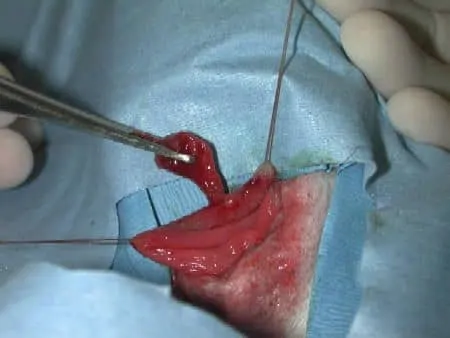Key Points
Rectal tumors typically cause straining to defecate and blood in the stools
Masses frequently can be detected on rectal examination, however in some cases endoscopy is required
Treatment is surgical removal
Prognosis is dependant on the type of tumor present – some are cured with surgery, yet others have a poor prognosis
Signs of rectal cancer
- Blood in stool
- Mucous in stool
- Diarrhea
- Straining to pass stool
- Crying out when defecating
Types of colorectal tumor
- Rectal carcinoma has three forms
- annular or napkin ring conformation – this tumor involves the entire circumference of the bowel
- cobble stone conformation – this tumor is nodular and is slightly raised
- polypoid conformation – this tumor has a narrow stalk
- Other less common tumors
- lymphosarcoma
- mast cell tumors
- plasma cell tumors
- leiomyosarcoma
- and many others
Diagnostic tests
- Digital rectal palpation
- Radiographs
- abdomen
- chest
- Abdominal ultrasound
- Endoscopy (plexible camera) of large bowels (enemas must be given one day prior to the scoping, fasting must start one day prior to enemas, but water is not with held)
- Biopsy of the mass (may be done prior to surgery if tumor is very extensive, or may be done after surgery if tumor can be safely removed)
Surgery
- Some tumors can be removed by pulling (prolapsing) the bowel through the anus; in the photo below the rectal polyp was exposed via prolapsing the bowel

- Some tumors are too far inside the rectum may require making an access through the bottom of the pelvis
- Some tumors need to be removed by making an U-shaped incision around the top half of the rectum
- Other tumors require opening the abdomen and pulling the tumor through the outside
Prognosis
- Napkin ring carcinoma – mean survival of 1.6 months
- Cobble stone carcinoma – mean survival of 22 months
- Polypoid carcioma insitu – mean suvival of 32 months
- this tumor potentially can be cured with surgery
Potential complications
- Temporary problems (these problems typically resolve within one or two weeks from surgery)
- Straining to defecate
- Blood in stool
- Painful defecation
- Serious complications (the more aggressive the surgery required, the greater the risk for these problems)
- Breakdown of the incision site, resulting in lifethreatening infection and potential death
- Breakdown in the surgical sites, resulting in a fistula (hole) in the skin around the anus the communicates with the bowel
- Progressive stricture (narrowing) of the bowel at the site where the tumor was removed


